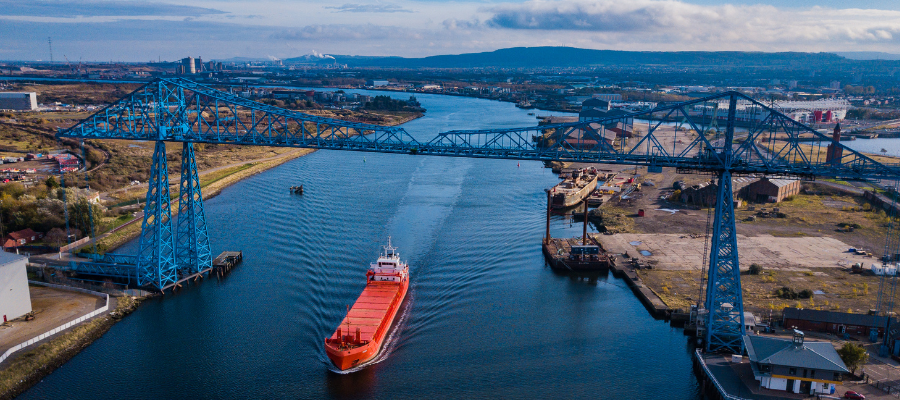🕒 Article read time: 2 minutes
Hydrogen ship trial to take place in Tees Valley

The UK’s first demonstration of zero-emission marine technology was announced by a consortium of partners in the Tees Valley last week (19 January 2021).
Designed to demonstrate a potential way for the maritime sector to decarbonise, the trial will see the conversion of a Lochin 33 ‘workboat’ into a dual-fuelled vessel acting as a testbed to prove the concept of a retro-fit green hydrogen solution. The modified marine vessel will operate at sea during the demonstration, but the technologies are also suitable for use by inland waterway vessels. The project is expected to take seven months, with trials running in spring 2022.
DEPLOYING GREEN HYDROGEN NO SIMPLE TASK
The deployment of green hydrogen as a fuel in marine vessels is not a simple task, however. It is complicated both by a lack of suitable hardware and the wariness of ship owners and users to use hydrogen owing to supply and safety considerations.
“A successful trial to a marine audience will need to demonstrate a safe, viable end-to-end retro-fit solution including a reliable marine green H2 refuelling structure,” explained John Carter from Duodrive Limited, one of the consortium’s partners, “It is our intention for this project to demonstrate exactly that.”
POTENTIAL TO MOVE 25% OF LAND FREIGHT BY WATER
Maritime Research and Innovation UK (MarRI-UK) argues that it is possible to move more than a quarter of the UK’s land haulage by water by 2030. The innovation body estimates that a successful transition would add £1.8 billion additional revenue to the UK, create 39,000 extra jobs and reduce land-based GHG emissions by 30-40%. There are no plans or roadmap by the maritime industry to create a zero-carbon short sea shipping network in existence, however.
The consortium behind this demonstration hopes to prove a solution does exist by operating a concept demonstration vessel using a clean, safe, green-hydrogen marine transport solution in the controlled environment of the Port of Middlesbrough.
LONGEVITY OF VESSELS MEANS RETRO-FIT SOLUTION IS VITAL
“The government’s expectation is that by 2025 all new vessels ordered for use in UK waters are designed with zero emission capability,” Carter continued, “However, there are some 65,000 small ships currently in operation with a normal life expectancy of 50 years, which means they will be in use far beyond the UK’s target for #NetZeroMaritime of 2035. Any zero-emission capability therefore has to be an affordable retro-fit solution.”
The provision of a Hydrogen Refuelling Station within the Tees Valley Multimodal Hydrogen Transport Hub is a key component of the project. This is a living lab designed for the development of hydrogen powered transport systems, including small marine vessels. The Hub, and this marine vessel demonstration, are funded partly by Innovate UK and partly by industry.
POTENTIAL GAME CHANGER FOR MARINE DECARBONISATION
Alexandra Herdman, Public Policy Manager, Logistics UK, said: “While shipping represents a relatively carbon efficient mode for transporting freight, the pace of decarbonisation needs to increase to enable significant emissions reductions by the 2030s.
“If this trial of zero-emission marine technology manages to prove the concept of retro-fit green hydrogen shipping, it will be a potential game-changer for the decarbonisation of small marine vessels. Logistics UK welcomes this innovative approach to driving forward maritime decarbonisation and wishes the consortium of partners every success with its ambitious demonstration.”
The current partners involved in the project include Duodrive Limited, Durham University, Queen Mary University of London, and TRL. The quayside refuelling system, believed to be a first within the UK, will be facilitated by Octopus Hydrogen.
*www.logistics.org.uk/water
Published On: 27/01/2022 16:00:15

Comments Section
If you are a Logistics UK member login to add comments.